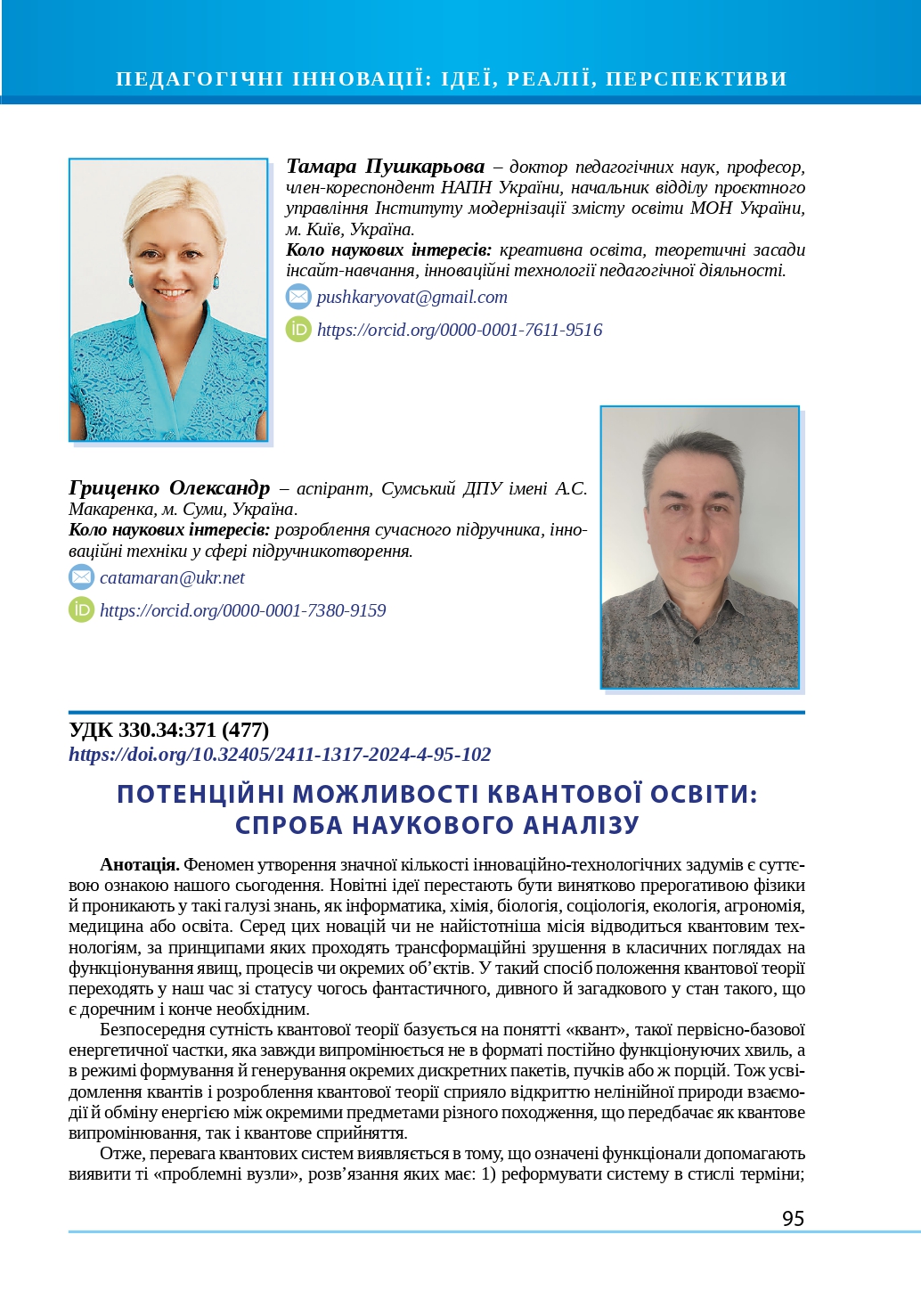Abstract
The phenomenon of the formation of a significant number of innovative and technological ideas is a significant feature of our present. New ideas cease to be exclusively and solely the prerogative of physics and penetrate into such fields of knowledge as computer science, chemistry, biology, sociology, ecology, agronomy, medicine or education. Among these innovations, perhaps the most significant mission is attributed to quantum technologies, according to the principles of which transformative shifts in the classical views on the functioning of phenomena, processes or individual objects are taking place. In this way, the provisions of quantum theory are changing nowadays from the status of something fantastic, strange and mysterious to the state of something that is appropriate and absolutely necessary.
The immediate essence of quantum theory is based on the concept of "quantum", such a primordial-basic energy particle, which is always emitted not in the form of constantly functioning waves, but in the mode of formation and generation of individual discrete packets, beams or portions. In this way, the awareness of quanta and the development of quantum theory contributed to the discovery of the non-linear nature of interaction and energy exchange between individual objects of different origins, which involves both quantum radiation and quantum perception.
Thus, the advantage of quantum systems is that the specified functionals help to identify those "problem nodes", the solution of which should: 1) reform the system in a short time; 2) significantly reduce costs and time for system component modernization; 3) identify weak links in the construction of system-forming connections and relationships; 4) provide for the replacement (transformation) of individual elements, parts or modules; 5) proactively use modern knowledge and experience from various fields of scientific research.
Therefore, modern education should not nowadays be localized within the framework of one field of knowledge, and research related to the modernization of the education system or its individual components (methods, technologies, teaching aids) should take place at the transdisciplinary nodal intersection of several scientific currents, which are able to suggest the most effective solution in the non-linear picture of world awareness and in the relationships between representatives of the national society.
References
Биков, В.О. (2020). Упровадження квантової едукації та STREAM-підхід в освітній діяльності Малої академії наук. Імідж сучасного педагога, 1, 70‒76.
Калошин, В.Ф. (2012). Формування позитивних особистісних змін у процесі професійного самовизначення студентів навчальних закладів. Практична психологія та соціальна робота, 11, 8‒17.
Ковальова, С.В. (2017). Дисемінація як складова терміносистеми педагогічної інноватики. Народна освіта, 1, 43‒48. https://narodnaosvita.kiev.ua/page_id=4344.
Маліцький, Б.А. (2024). Квантова властивість наукового знання: евристична точка зору. Наука та наукознавство, 1, 3‒20.
Пушкарьова, Т.О. (2022a). Інсайт-технологія: природа, структура, можливості. Український педагогічний журнал, 3, 108‒115.
Пушкарьова, Т.О. (2022b). Понятійний конструкт «релятивістська педагогіка» як важливий чинник новочасної освітньої парадигми. Український педагогічний журнал, 4, 112‒120.
Раджаманнар, Р. (2023). Квантовий маркетинг: Новий спосіб мислення. Київ: Наш формат.
Сипченко, О., Гарань, Н., Пилипенко, В., Бойко, І. (2022). Дисемінація ресурсів у освітній процес в умовах воєнного стану. Гуманізація навчально-виховного процесу, 2, 35‒45.
Соколович, Ю.А. Богданова, Г.С. (2010). Фізика: Навчально-практичний довідник. Харків: Ранок.
Schumpeter, A.J. (1998). The Theory of Economic Development: An Inquiry into Profits, Capital, Credit, Interest and the Business Cycle. Transaction Publishers. https://books.google.com.ua/b00ks/about/The_Theory_of_ Economic.
Bykov, V.O. (2020). Uprovadzhennia kvantovoi edukatsii ta STREAM-pidkhid v osvitnii diialnosti Maloi akademii nauk. Imidzh suchasnoho pedahoha, 1, 70‒76. (in Ukrainian).
Kaloshyn, V.F. (2012). Formuvannia pozytyvnykh osobystisnykh zmin u protsesi profesiinoho samovyznachennia studentiv navchalnykh zakladiv. Praktychna psykholohiia ta sotsialna robota, 11, 8‒17. (in Ukrainian).
Kovalova, S.V. (2017). Dyseminatsiia yak skladova terminosystemy pedahohichnoi innovatyky. Narodna osvita, 1, 43‒48. https://narodnaosvita.kiev.ua/page_id=4344. (in Ukrainian).
Malitskyi, B.A. (2024). Kvantova vlastyvist naukovoho znannia: evrystychna tochka zoru. Nauka ta naukoznavstvo, 1, 3‒20. (in Ukrainian).
Pushkarova, T.O. (2022a). Insait-tekhnolohiia: pryroda, struktura, mozhlyvosti. Ukrainskyi pedahohichnyi zhurnal, 3, 108‒115. (in Ukrainian).
Pushkarova, T.O. (2022b). Poniatiinyi konstrukt «reliatyvistska pedahohika» yak vazhlyvyi chynnyk novochasnoi osvitnoi paradyhmy. Ukrainskyi pedahohichnyi zhurnal, 4, 112‒120. (in Ukrainian).
Radzhamannar, R. (2023). Kvantovyi marketynh: Novyi sposib myslennia. Kyiv: Nash format. (in Ukrainian).
Schumpeter, A.J. (1998). The Theory of Economic Development: An Inquiry into Profits, Capital, Credit, Interest and the Business Cycle. Transaction Publishers. https://books.google.com.ua/b00ks/about/The_Theory_of_ Economic. (in English).
Sokolovych, Yu.A. Bohdanova, H.S. (2010). Fizyka: Navchalno-praktychnyi dovidnyk. Kharkiv: Ranok. (in Ukrainian).
Sypchenko, O., Haran, N., Pylypenko, V., Boiko, I. (2022). Dyseminatsiia resursiv u osvitnii protses v umovakh voiennoho stanu. Humanizatsiia navchalno-vykhovnoho protsesu, 2, 35‒45. (in Ukrainian).

This work is licensed under a Creative Commons Attribution-NonCommercial-ShareAlike 4.0 International License.


